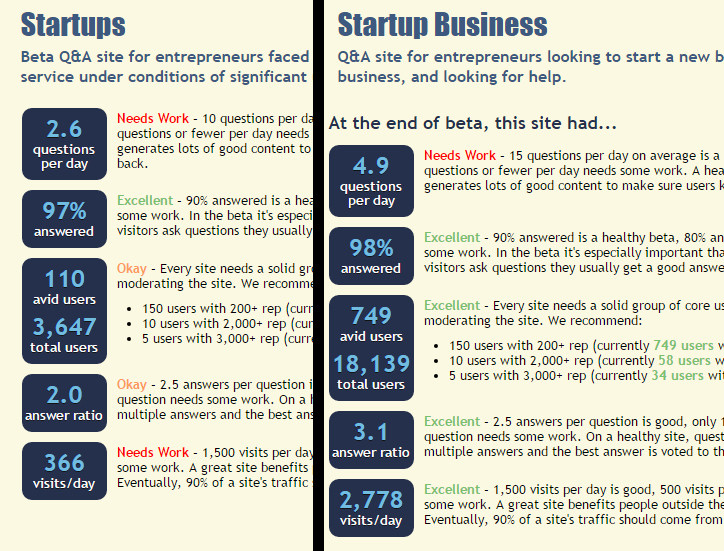Back in April of 2010, Joel shared our assumptions about the role of small sites in the newly minted Stack Exchange network:
If a site does not have enough activity at the end of 90 days, it will be closed down. Any existing Q&A will be archived and made available for download, but the site itself will not remain live. Small, unhealthy sites do nothing but draw traffic away from other sites, splitting audiences, so we don’t want to keep them around.
Past experience had led us to believe that “small” and “unhealthy” would mean the same thing: we took it as a given that quiet sites would develop spam and obvious broken windows, while high quality sites would always grow big and graduate. But you proved us wrong! Five years later, we have lots of tiny sites which have been in public beta for months or years, each consistently producing excellent Q&A which helps people with real problems. Small, consistently active sites are great!
Our old assumptions didn’t pan out, but we never provided clear updated criteria for when we would close or graduate a Q&A site. We're rectifying that now.
The TL;DR:
- When a site starts to consistently receive 10 questions/day, we’ll consider it for graduation.
- If a public beta site does not produce consistently helpful content, and lacks the caretakers needed for flags and spam to get handled and our Be Nice policy to be upheld, it will be closed.
Is your site in between these two categories? You don’t have anything to worry about. Regardless of how small the site might be, you have a home here in the SE network. Spoiler alert: As of this post, no site which is currently active is at risk of being shut down.
If you’d like to learn more about the nitty gritty details, read on.
Clarifying graduation
While Community Managers have historically had high levels of agreement about when a site should graduate, we arrived at our conclusions via totally different methods. When Pops joined the team after being a longtime user, he noticed this, and decided to examine our assumptions and procedures. He also wanted to apply some lessons from the research showing that well-designed data-backed algorithms and heuristics are more effective at making decisions than human intuition alone.
Graduation is a hard concept to pin down quantitatively, but we basically expect that a graduated site should be able to continue growing and governing itself indefinitely without any outside help unless something truly catastrophic happens.
Pops looked at a wide variety of statistics and how they tracked on sites we've graduated in the past, and discovered that there was a strong correlation between graduation and the number of new questions a site receives per day. Fast forward through all the boring analysis, and here's the result: from now on, when a site starts to consistently receive ten new questions every day, we'll consider it for graduation. This is not 100% automated; CMs will still be manually checking on how individual communities are doing, and some sites might still graduate "earlier" or "later" than their question activity alone would suggest; but it's an effective rule of thumb.
Tangible guidelines for site closure (aka Reasons why you shouldn’t be afraid)
While Pops worked to clarify graduation, I looked at things from the opposite direction: site closure. The precedent was set early on that sites had two options; graduate, or get shut down. This created a lot of unnecessary angst for our smaller and mid-sized communities. Lots of folks on excellent sites assumed that since they hadn’t cleared the graduation hurdle yet, we might come in and turn off the lights at anytime. Not exactly great for morale.
Thanks to many devoted users, it’s grown clear that smaller SE sites can do a great job of maintaining themselves and producing high quality Q&A. Not every site is going to be a blockbuster success, but our small sites are serving their own communities well. We’re proud of you, and we want you here.
What does this mean? If there's enough moderation for a public beta site to consistently remain free of spam, for flags to be cleared, and for our Code of Conduct to be upheld, your site will remain open. However, if community leaders drop off, flags sit without being addressed, and we can’t find any suitable volunteers to step forward, the site gets closed.
As of this post, not a single site currently active in our network is at risk of being closed. Closing public beta sites is a rare occurrence; we expect it to stay that way.
Success and graduation are not the same thing
When the network was just getting started, we all worked off of judgment calls and personal experience because that was all we had. Since then, we've tested our assumptions and we’re excited to have been able to create more objective criteria for some of our most important decisions. The "trial by fire" approach to site launches and graduations was a great early motivator for communities, but in reality, success and graduation aren’t the same thing. Now, communities can focus on Q&A about topics they love, not on whether their site will survive. We’re proud of what you’ve accomplished so far. We hope you are too.


